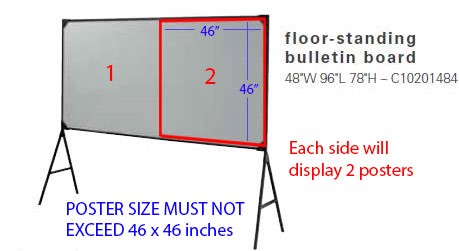
Graduate Poster Sessions
The Moody School of Graduate and Advanced Studies will host the Graduate Poster Sessions on Thursday, March 26, 2026. The event will include a morning session and an evening session in the Moody Hall Atrium
Information for Presenters
All SMU graduate students and postdoctoral scholars are eligible to present research posters. The deadline to register is Monday, March 9.
Click here to register
Prizes
Judges will evaluate each poster for design, clarity, and overall effectiveness. The Moody School of Graduate and Advanced Studies will review the judges’ scores and comments to determine award recipients.
A cash prize of $250 will be awarded to the best poster from each department or judging group.
Poster Requirements and Dimensions

Where Can I Print My Poster?
2025 Award Winners:
Anthropology: Samantha Lagos, “A Comparison of Surface Detection Methods for Storage Pit Prospection and Capacity Estimation in Aotearoa, New Zealand”
Biological Sciences: Ayesha Alkofahi, “Thermoregulatory Dysfunction in Kcna1-Null Mice: A Model for Sudden Unexpected Death in Epilepsy”, Co-author(s): Fallon Wenck; Indumathy Jagadeeswaran; Kelsey Paulhus; Julia Lara; Praveen Kumar; Brian Zoltowski; Edward Glasscock
Biostatistics: Ellen Taylor, “Using Machine Learning to Predict Concussion Recovery Time: The Importance of Psychological and Symptomatic Factors”, Co-author(s): Logan Shurtz; Stephen C. Bunt; Nyaz Didehbani; C. Munro Cullum; Kristin Wilmoth
Chemistry: Juliana Antonio, “Noncovalent Interactions in Mutated Myoglobin Proteins Revealed Through Local Vibrational Mode Theory”
Civil & Environmental Engineering: Ahmed El Saei, “Characterization of Ballast Mechanical Properties Post Tamping Maintenance”
Civil & Environmental Engineering: Sergio Escudero, “Analysis of Spatiotemporal Variability of Methane Surface Concentration from Underground Natural Gas Leaks Using a Low-cost Sensor Unit”, Co-author(s): Venkata Rao Gundapaneni
Combined Group: Alvin Leluc, Physics, “Detecting Ripples in Space with Light from the Early Universe”, Co-author(s): Alexander Van Engelen
Computer Science: Timothy Lee, “Lightweight, Modular Transformer for Noise-Resistant Multivariate Time Series Forecasting”
Computer Science: Zeyu Deng, “Tangible Virtual Reality PIN Authentication with Coordinated Multi-joint Biometric Security”, Co-author(s): Jingwei Zhang
Economics: Jisub Shin, “Fertility, Education Competition, and Spatial Inequality in South Korea”
Education: Allison Dennis, “Investigating Longitudinal Changes in Fractions Knowledge: A Multilevel Modeling Approach”, Co-author(s): Joanne Joo
Electrical and Computer Engineering: Yazan Yassin, “Fast Charging Lithium-ion Batteries in Extreme Cold Conditions”
History: Holly Harris, “Amercements and Authority: Legal Enforcement in Walsham-le-Willows During the Black Death”, Co-author(s): Allie Shulman
Mathematics: Jacob Davis, “Droplet Levitation over the Non-isothermal Surface of an Evaporating Liquid Layer”, Co-author(s): Vladimir Ajaev
Operations Research: Jackson Forner, “The Value of Smart Right-hand Side Predictions in Optimizing Uncertain Networks”, Co-author(s): Harsha Gangammanavar
Postdoctoral Scholars: Ayesh Madushanka Kalapuwage, “QM40: QM-based Dataset for Drug Discovery”, Co-author(s): Renaldo T. Moura, Jr.; Elfi Kraka
Postdoctoral Scholars: Alexis Delgado, “Hybrid and Mixed Basis Set Strategies for XPS Calculations of Small Water Clusters”
Psychology: Sofia Uribe, “Examining Impairments in Working and Episodic Memory in Young Adults with Anhedonia”, Co-author(s): Alicia E. Meuret
Psychology: Melissa Sitton, “Spirituality, Self-Blame, and Trauma Symptoms among Youth Awaiting Treatment after Sexual Abuse”, Co-author(s): Caitlin Rancher; Jeanine Johnson; Madeline Reedy; Annette Mahoney; Renee McDonald; Ernest Jouriles
Statistics and Data Science: Yifei Wang, “Mitigating Outcome Reporting Bias in Multivariate Meta-analysis: A Semiparametric and Scalable Approach”, Co-authors: Lifeng Lin; Yu-lun Liu
Sustainability and Development: Rutuja Lele, “Mapping Environmental Degradation and Empowerment: Case Study of Women Miners in Santa Rita, Andes, Colombia”